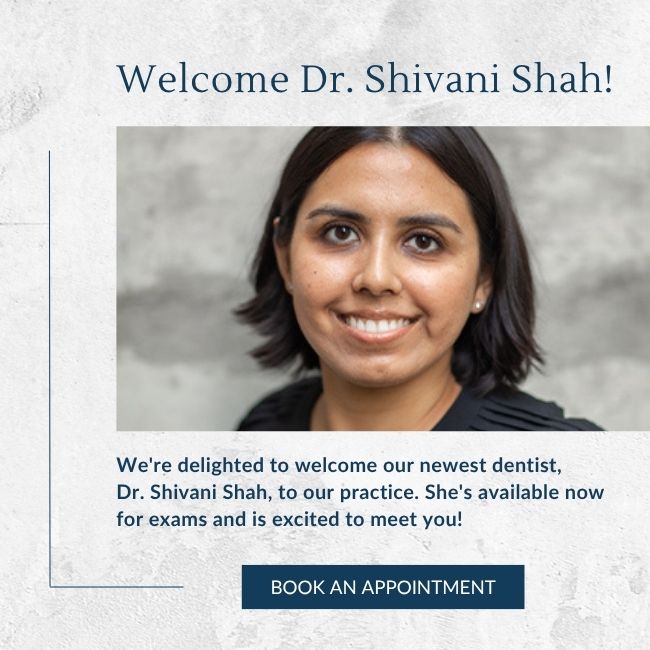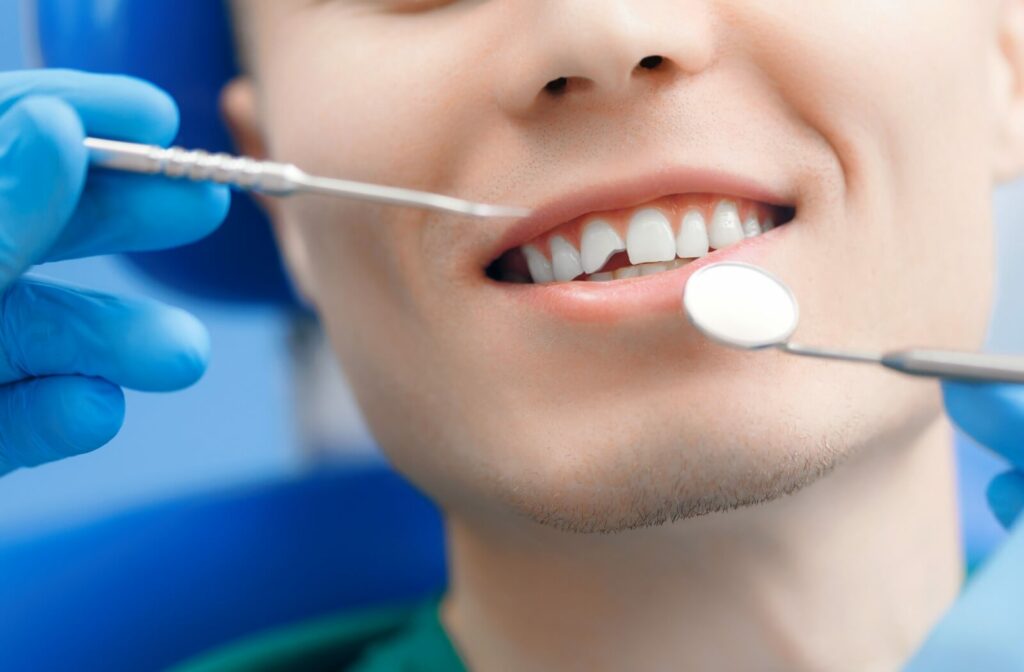Teeth can get cracked or fractured in many ways—from grinding your teeth, getting older, or even having an accident. Dental issues are often daunting, but can be especially so when they involve the possibility of losing a tooth. Unfortunately, because teeth are not living tissue, a broken tooth cannot heal on its own. Fortunately, depending on how much damage your tooth has, several treatments are available to fill in the gap or remove a severely damaged tooth.
How to Tell if a Tooth is Cracked or Broken?
Identifying a cracked or broken tooth can sometimes be tricky. Your dentist, however, can do so quickly, and can let you know which of the five categories your crack falls into:
- Cracked Tooth: a vertical crack from the biting surface of the tooth to the gum line, sometimes extending into the gum line and root
- Craze Lines: a small, thin crack on your tooth enamel that doesn’t hurt; also known as hairline cracks
- Fractured Cusp: a crack that forms around a dental filling that typically isn’t very painful
- Split Tooth: A crack that splits your tooth into two parts, with a crack potentially running below the gum line
- Vertical Root Fracture: a crack that starts below the gum line and moves towards the surface of the tooth, typically not causing any symptoms unless infection is present
One of the most apparent signs of a cracked tooth is visible damage. If you look in the mirror and see a crack or chip, that’s a clear indicator. Sometimes, the damage might be minor and not immediately noticeable, so a thorough check is essential.
Pain is another significant symptom. You might experience sharp pain when biting down, chewing, or even when your tooth is exposed to hot or cold temperatures. Sensitivity to sweet foods or drinks can also be a red flag.
Another sign is swelling around the affected tooth and gums. If your gums are swollen or tender to the touch, it could mean the tooth is cracked or broken.
Can You Survive with a Broken Tooth?
Surviving a broken tooth might be possible, but it’s far from ideal. A fractured tooth can expose its inner layers to bacteria, potentially leading to an infection. This infection can spread to other body parts, causing more severe health problems. Moreover, living with a broken tooth can cause persistent pain. The exposed nerves can lead to discomfort, making eating and drinking difficult.
How Long Can a Broken Tooth Go Untreated?
The answer varies, but it’s generally not recommended that you delay treatment. In the short term, a broken tooth can cause pain and sensitivity. Eating and speaking might become uncomfortable, affecting your quality of life. Bacteria can enter the crack, leading to decay and cavities.
The situation may worsen if left untreated. The crack might deepen, making the tooth more vulnerable to further damage. Or, infections could form, affecting the surrounding gums and possibly leading to abscesses.
Over the long term, untreated broken teeth can result in severe infections that might need root canal treatment or even tooth extraction. The surrounding teeth and bone could also be affected, leading to more extensive dental work.
Can a Broken Tooth Still Be Fixed?
The good news is that many broken teeth can be restored. The type of treatment that is needed depends on the severity of the break. For minor chips, a dentist might use dental bonding. This involves applying a tooth-coloured resin to the chipped area, restoring its shape and function. It’s a quick and painless procedure that can often be completed in one visit.
A crown might be used to repair a tooth if the break is more significant but doesn’t affect the root of the tooth. A dental crown covers the entire tooth, providing strength and protection. This procedure usually requires two visits—one to prepare the tooth and take impressions, and the second to place the crown.
Can a Badly Broken Tooth Be Saved?
Even badly broken teeth have a chance of being saved. A root canal may be the best solution for severe breaks that expose the pulp of the tooth. Root canals remove damaged pulp, clean and seal the tooth, and often involve placing a crown to restore strength. This ensures the tooth remains functional and pain-free.

In cases where saving the tooth isn’t feasible, extraction might be necessary. Fortunately, dental implants offer a reliable solution. They replace the missing tooth with an artificial one that functions and looks like a natural tooth.
Preventing Broken Teeth
You cannot fix a cracked tooth at home, but you can take steps to prevent breaking teeth.
- Practice good oral hygiene. Maintaining excellent oral hygiene reduces the risk of decay and cavities, which can weaken teeth. Brush twice daily, floss regularly, and use mouthwash to keep your teeth strong.
- Use protective gear during sports or other activities (like riding a bike, ice skating, or gymnastics) that involve potential impacts to your mouth or teeth. Custom-fitted mouthguards offer the best protection.
- Avoid chewing on tough foods like ice, hard candies, and unpopped popcorn kernels. These can cause your teeth to crack or break.
Broken teeth can be a stressor, but with prompt treatment and mindful prevention, you can ensure they don’t disrupt your life. Modern dentistry offers solutions to save and restore your teeth from minor chips to severe breaks. Remember, acting quickly can prevent further complications. If you suspect a broken tooth, consult your dentist immediately.
Belman Dental Centre knows that dental accidents or emergencies can happen with little to no warning and aims to support the health and longevity of your smile at all times. Contact us today to see how we can help protect the future of your teeth and overall oral health.




